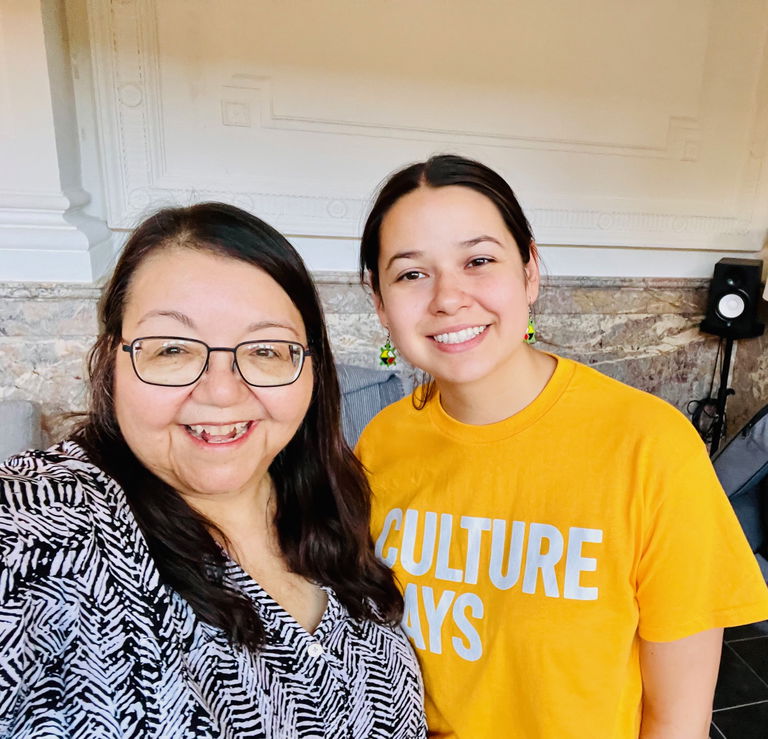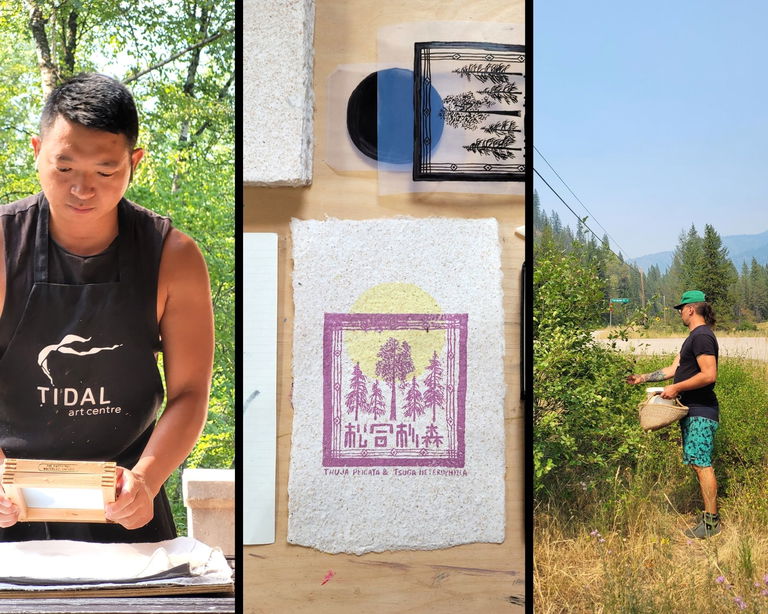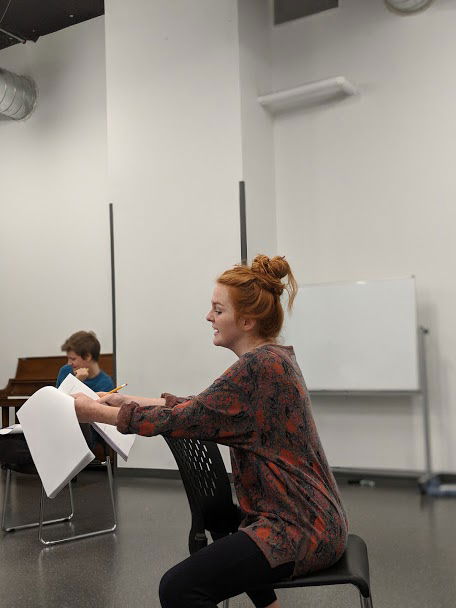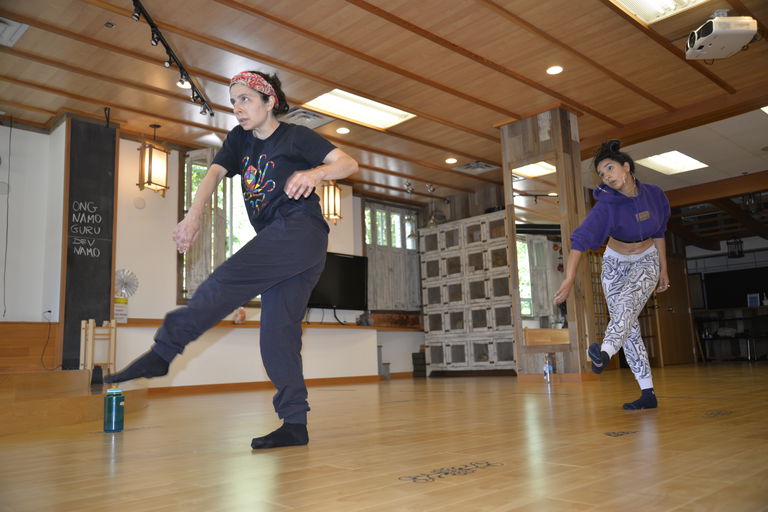
RECONNECTING Communities Through Creativity and Collaboration
Mallory Gemmel
Sep 8, 2021
Pursuing a career path in the creative industry always leads to a motion-filled and interactive journey. Whether you’re an artist, cultural programmer, or storyteller at the beginning of your career or near its end, there is always more to learn about your craft, your community, and the impact of your work. Many who engage in the creative and cultural fields know that the sharing of knowledge is a powerful tool for growth and community building. Mentorship and collaboration is fruitful. It’s how artists, organizers, and thinkers pass on knowledge, cultivate communities, reflect on the past and pave new, meaningful paths for the future.
Each year, BC Culture Days invites several artists across the BC region to apply for the Culture Days Ambassador Program. Through the financial and organizational support of the ambassador program, artist ambassadors are encouraged to act as spokespeople for Culture Days. Above all, these artists are creative catalysts who foster interaction, communication, and growth in their communities. For learning’s sake, each ambassador is paired with a mentor: an established artist or creative from their region or network. With support from Culture Days and their mentors, each artist devises a Culture Days event that reflects their practice and goals, free for their communities to participate in.
This year, BC Culture Days has extended the mentorship program from its typical three month duration to six. The work produced during the 2021 ambassador program addresses the theme of reconnection—an action of significance in light of the isolating afflictions that so many communities and individuals have experienced this past year.
The RE:CONNECT: 2021 Ambassador Series includes nine ambassadors who work in diverse territories across BC with art modalities ranging from filmmaking and photomaking to curating, dancing, beadmaking, storytelling, cello playing, illustrating, interdisciplinary exploring, and more. Through collaboration and mentorship, these ambassadors have developed insightful and impactful projects that have helped them renew their relationships with their communities and build new relationships with communities that they otherwise wouldn’t have connected with.
BC Culture Days spoke with the ambassadors to ask them about their time in the program and as mentees. We asked each ambassador to express their biggest takeaway from the program thus far and to reflect on how their mentor has enabled them to interact with and learn from their communities.
August Bramhoff is a visual artist who experienced a traumatic brain injury in 2013. After this injury, they started the process of re-learning and adapting to being a working artist living with a disability.
August’s mentor, Yuri Arajs, has dedicated much of his practice to advocating for fellow artists, including artists who live with a disability. He is the former Artistic Director of Kickstart Disability Arts and Culture in Vancouver.

August’s biggest takeaway with the program has been the ability to help other artists they’ve encountered during their work advocating for creatives living with disabilities. They appreciate knowing that they’ve been able to put people in touch with others. The mentorship has been a way for August to regenerate their working relationship with Yuri as the pair previously knew each other through Kickstart Disability Arts and Culture.
August is in a unique position working with Yuri as he also works with artists living with disabilities; he has a meaningful understanding of collaborating with the community and has helped August build and connect the community in a new way. Curating an online exhibit is a new territory for August, and Arajs’ rich knowledge as a curator who has worked alongside diverse artists has helped build their exhibition.
Ambassador Alyssa Amarshi has also reunited with a previous colleague through the mentorship program. 
Alyssa has a passion for performing and expressing. She is interested in diverse types of cultural expression, especially movement and intermodal art.
Alyssa’s mentor, Cristina Bucci is a dance artist and the creative director of Ouro Collective. Cristina was Alyssa’s first mentor when she moved to Vancouver several years ago, but the duo haven’t worked together in eight years. Being able to reconnect with Cristina has instilled Alyssa with confidence. Her biggest takeaway with the program has been working with Bucci. The mentorship has strengthened Alyssa’s personal practice, emotional well being, and the creation of her event. 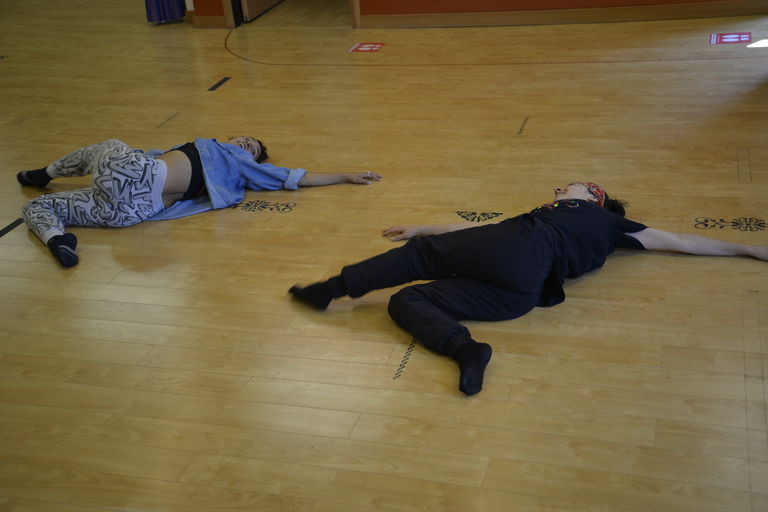
The mentorship program and interaction with other ambassadors has helped Alyssa reframe the way she thinks about art, connection, and collaboration, especially when it comes to thinking about how we connect and how we exist on this unceded land.

Jean Baptiste, Kihêw Mahihkan tayôhkan Iskwêw, is a nonbinary Two-Spirit storyteller and artist. Their initial medium of bead making has evolved into incorporating traditional Indigenous mediums with contemporary mixed media such as poetry and spoken word.
Jean’s mentor is Jennifer Pighin who is the board chair of the Omineca Arts Centre located on the traditional territory of the Lheidli T’enneh, otherwise known as Prince George.
“When it came to putting in my proposal for BC Culture Days, I really wanted to do something that incorporated not just artistry but community, spirituality, and connection to self.” Jean’s time as an ambassador has revealed to them the importance of small community-based arts programs and community art spaces.
A few months ago, Omineca Arts Centre, the place where Jean completed a residency and is working alongside mentor Jennifer, was facing closure due to Covid-19. This centre is a place for cultivation and safety in more ways than people may give it credit for. As a Two-Spirit person, Jean has realized the representation and community that this space provides for Indigineous, Queer, and Two-Spirit people.
“I recently finished my artist residency with Omineca…there was this technical aspect to it that I really appreciated because it’s completely outside of my wheelhouse of understanding.” Jennifer has passed on invaluable curatorial knowledge to Jean–from learning technicalities of gallery operations to CARFAC standards and the importance of paying artists for their work to the power of providing art spaces that represent and give opportunity to artists whose work may be undervalued. Jean says, “We’ve had a lot of conversations around contracts and getting paid and what is fair compensation…getting Indigenous art valued in Northern BC is incredibly difficult, and Jennifer’s been a big help in me understanding the value of fine art and how it’s more important that I even understand it to be. It’s been cool to have her lens of valuing things.”
During Jean’s residency, they were invited to participate in a community drum group, where they reconnected with their community elders. In reconnecting, Jean was invited to participate in the “Wiping the Tears Healing Ceremony.” This ceremony was an “opportunity to grieve and let go of the pain they may be experiencing as a result of the recent finding of 215 unmarked graves of Indigenous children at the Kamloops Residential School site.” It took place in June of 2021 at the site of the former Lejac Indian Residential School. Jean assisted an Elder travel the 160 kilometers distance from Prince George to the Lejac site.
This experience was rewarding for Jean. “I wouldn’t have been able to do that if I hadn’t connected with the space, if I didn’t sit there and show up and participate. I think that really speaks to how important just being there is.” Having access to community-based spaces where opportunities like this can unfold is a powerful thing in itself.
Laura Rechwan is an multidisciplinary artist and cultural ambassador who believes in the transformative power of creativity. Her mentor, Jock Hildebrand is an international public sculpture artist who has worked as a leader of the non-profit, the Cowichan Public Art Gallery Society.
“Having the title of ambassador has given me the ability to approach organizations, non-profits, and other artists as an organizer with more confidence. Using the title in my introductions gets the ball rolling faster; it’s a lot easier than it would be if I was just myself as an organizer. My biggest takeaway with this whole project has definitely been confidence and making connections that wouldn’t have otherwise happened.”
Laura is working with Jock to create a “from the ground up manual on how to start an art gallery.” Jock’s experiential knowledge has been informative. Working with Jock in real-time has given her the opportunity to ask questions and to directly translate his knowledge into the manual, covering things like what goes into building an art gallery, what roles need to be filled, what challenges gallery directors face and how to draft financial pitches for monetary support to how to make spaces for community engagement. When building a guide like this, access to community and collaborative resources is an evident necessity. Building a non-profit organization or community space takes collaboration, mentorship, and connection.
Laura adds that the skills, tips, and knowledge gained through her mentorship has translated to her current professional obligations. She’s helping a local arts organization find a new physical space and rebuild their operations.
Ambassador Tara Rajah is a classically trained cellist with a practice that includes experimental music and community-engaged performance. Her project reflects on the experience of human migration and the sharing of knowledge. She voices, “What we bring from one place, we must nurture in a new place.”

Tara’s mentor, choreographer Julie Lebel, is invested in community-engaged dance and in interactions between public space and community. Julie is also the artistic director of Foolish Operations.
In Tara’s perspective, meeting the other ambassadors and understanding their art forms and processes has been a great way to share art and culture and become part of a rewarding community. The Culture Days team has also shown her how to develop and manage an event with professionalism.
Tara’s mentorship with Julie and the connections it has harboured with Foolish Operations has expanded the scope of her Culture Days project and her performance repertoire. She’s gone on to perform in Foolish Operations’ Moving Resting and Nesting series, which was part of the Surrey Civic Theatre’s Summer Pop festival. These performances have given Tara the opportunity to connect with the Foolish Operations community and the general public.
“My collaborator, dancer Kira Radosevic has also been part of this mentorship journey, and it’s been a fantastic experience working and learning together with her,” says Tara. Julie has guided them to interact as one—showing them how to lean into each other’s crafts and choreograph symmetry between dancing and musical scoring. “We have also been mentored by other musicians, composers and dancers on the Foolish Operation team on aspects of dramaturgy, composition, improvisation, performance, and audience interaction for the piece.
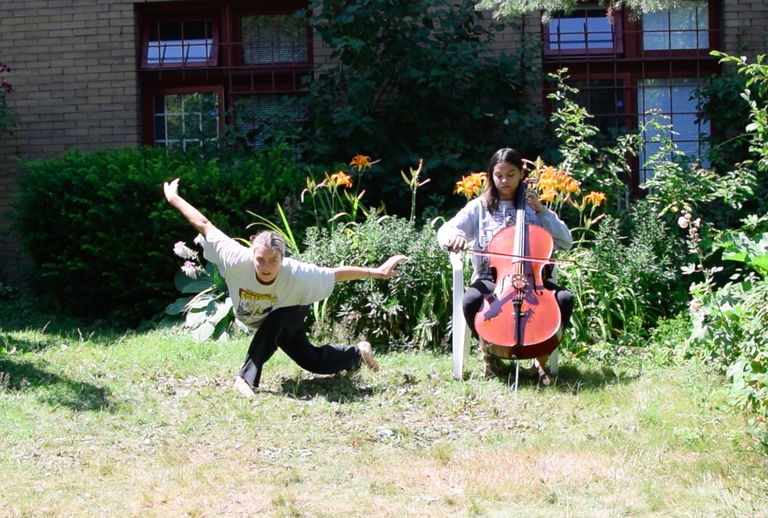
“My biggest takeaway that I’ve gained from being an ambassador has been the importance of collaboration,” says Carter Kirilenko who is a documentary film-maker, director, and producer focused on environmental issues, notably the intersection between climate change and human health. Jason van Bruggen, Carter’s mentor, is a globally-represented Canadian photographer and filmmaker.
Carter’s work with Culture Days entails the creation of two short films. One film explores an Indigenous-led plan that is protecting key watersheds in Nootka Sound and helping to recover wild salmon populations.
“We collaborated with Mowachaht/Muchalaht and Nuchatlaht First Nations, as well as CPAWS-BC and a small group of artists to bring the film to life. Each person brought forward a unique skillset and body of knowledge that contributed towards creating an impact-driven film. I’m learning that in order to create films on environmental issues, it’s imperative to do so in a way that emcompasses a collaborative approach with Indigenous people as they’ve been stewarding and living in harmony with these lands since time immemorial,” says Carter.
The experience working with Jason has been encouraging; it’s helped Carter gain patience, to try new cinematographic techniques, and to dive deeply into the storytelling process. This time has driven Carter to deliver pitches for film concepts to distribution platforms such as the Waterbear Network. Jason’s intricate knowledge in delivering has helped refine these pitches. Jason has supported Carter in building a network, putting him in touch with Jimmy Matteoni, who is now a main interview subject in one of his films.
Valeria Ascolese is a multidisciplinary artist and educator who focuses on making art accessible to everyone and anyone by bridging ideas of cultures, languages, and identity into her work.
Valeria’s mentor, Guillermo Verdecchia is a writer as well as a director, dramaturge, translator, and actor. He is the recipient of a Governor-General’s Award for Drama for his play Fronteras Americanas and a four-time winner of the Chalmers Canadian Play Award.
“After a year filled with uncertainty and changes, being an ambassador really taught me to be open to all possibilities, and to not shut it down just because it is out of my comfort zone,” says Valeria. She’s become comfortable taking and making space for herself as a leader and organizer of her event.
Valeria’s mentorship with Guillermo is exciting. She expresses that, “Guillermo is someone that I’ve looked up to for many years in my career.” Through his mentoring, he has equipped Valeria with mindful tools that have shown her how to conjure courage for sharing vulnerability through her work. She’s found braveness in sharing her writing—something that is new for her and required heart—with a community of others.
“Not many people can say that they’ve had the privilege to work with one of their artistic role models. Working with Guillermo has been as amazing as I imagined it would be. Not only did he help me professionally in playwriting, but he also became a wonderful confidant and friend throughout this journey. This mentorship was profoundly formative for me, and it provided me with tools that I can take with me forever.”
Ambassador Jeni Chen became a full-time illustrator after the birth of her son, when she started drawing comics about the funny things her son said or did. Natasha Smith, Jeni’s mentor, is also inspired personal and physical environment. She is a self-defined teaching artist and has taught at the Kootenay School of the Arts, Oxygen Art Centre (where she was a founding member) Metchosin International Summer School of the Arts and Summer Series in Red Deer.

Being an ambassador has encouraged Jeni to push her boundaries; she’s found reward in pursuing teaching and sharing her knowledge through a workshop, something she wasn’t previously comfortable with. During the pandemic, art journaling experience helped her create, relax, and have fun with her family. She wants to share this experience with more people and believes that art journaling is therapeutic, inclusionary, and a boosting source for creativity.
Working with Natasha has helped Jeni tremendously—Natasha has been filling in Jeni’s knowledge and skill gaps when it comes to showcasing her work and creating an interactive workshop. Jeni says, “Sometimes being an artist is a lonely endeavor, but having a mentor that you can bounce ideas off of is incredible. That’s why I’ve decided to create a free Facebook group for the people participating in the Art Journaling for Beginners workshop, so we can share our art, our ideas, support and inspire each other.”
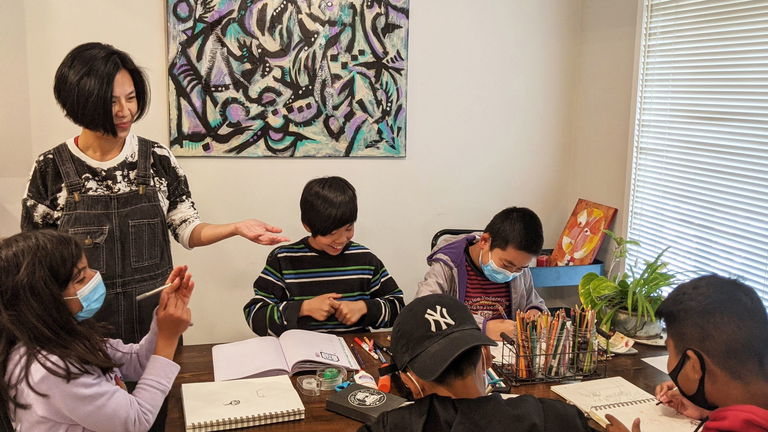
Kenthen Thomas is a member of the Secwepemc Nation in Salmon Arm, BC. Working with and being trained by such groups as Secwepemc Native Theatre, Senclip Native Theatre, and Caravan Farm Theatre, has helped him develop his craft of storytelling. As a teacher, he also works hard to infuse and integrate Indigeneity into the educational system of both public and post-secondary institutions.
Kenthen’s mentor, Dr. Billy Cohen is from the Okanagan Nation. He is an educator, artist, storyteller, author, and Assistant Professor in the UBC Okanagan School of Education, specializing in the areas of Indigenous knowledge and transforming pedagogy.
“The biggest takeaway is the amount of attention that’s paid to the program and to Culture Days,” says Kenthen. He’s been taken by how the community of Salmon Arm has come together with interest and excitement for the event and for Culture Days in general. It’s especially apparent in the past weeks or so. The increased support is unfolding as media announcements are released and because Culture Days is quickly approaching.
The mentorship has posted some challenges in the interior because of the uptick in Covid-19 cases and due to the state of wildfires. Kenthen and Dr. Billy Cohen have decided that limiting visits in person might be a prudent idea. Challenges aside, Kenthen says, “having a mentor is a brilliant idea.” Having a source to reach out to when he has questions in preparation for his storytelling event has been informative. Because of the nature of his event, it’s important that he follows protocols and Indigenous traditions respectfully. Working with Dr. Billy Cohen is rewarding, because of the knowledge-sharing that’s ensured Kenthen has checked in with his elders and Dr. Billy Cohen has reached out to his elders and peers for consultation about traditional stories and practices.
To learn more about this year’s incredible ambassadors visit here. Read about the engaging and impactful practices of the mentors here. To find out about how you can connect with the ambassadors and experience their events follow the RE:CONNECT: 2021 Ambassador event series here.
BC Culture Days would like to acknowledge that the Ambassador program was made possible by the generous support of the Canada Council, BC Arts Council, and Odlum Brown Limited.


